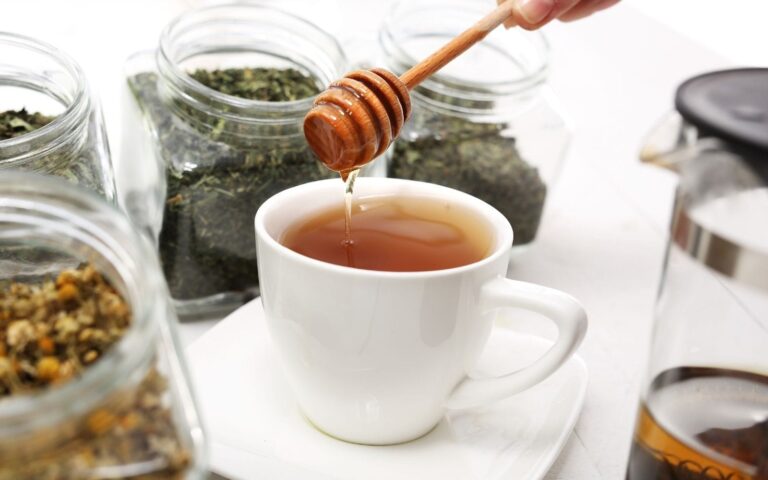Adding Milk To Green Tea: Ultimate Guide

Disclosure: This post may contain affiliate links. If you click on a link we may make a small commission at no extra cost to you. You can read the full disclosure here
Adding Milk To Green Tea
Many of us are used to taking our black tea with milk, but what’s the thinking behind green tea with milk? Is it just down to personal preference, or are there any detrimental effects to either the taste or many purported benefits?
The tea market continues to grow year after year and this is understandable when tea consumption is associated with a reduced risk of heart disease. It is one of the most popular beverages consumed worldwide, with green tea being one of the healthiest on the market. But to enjoy all of its benefits to the full, should you or should you not be adding milk to green tea?
Can you have milk in your green tea?
Adding milk to green tea is definitely possible. Whilst it’s not typically common practice for green tea to be served with milk as standard, it does not mean it cannot be done. The general consensus amongst avid tea drinkers is that green tea is best served without milk, both for flavor and health benefit maximization. However, adding milk to green tea if it’s required is something many people do.
What is Green Tea?
Green tea first originated in China, but it is now manufactured and produced in many other countries. It comes from the leaves and buds of the Camellia Sinensis plant and retains its green color as, unlike black tea, it remains unprocessed. This is also the reason it contains so many health benefits and is loaded with antioxidants.
Many consider green tea to be a superfood and for centuries it has been recognized for its healing properties. Its healthy reputation as a potent antioxidant comes from a type of plant-based compound called catechin, namely epigallocatechin gallate.
Catechins can be further classified into a larger group of plant compounds known as Polyphenols. Several studies show that polyphenolic compounds present in tea reduce the risk of a diversity of diseases. So already it’s clear to see that green tea is so much more than just liquid refreshment!
How Is Green Tea Different From Black Tea
Green and black tea both originate from the same plant species, Camellia Sinensis. It’s just down to how the leaves are processed and the variety of tea plants selected for the brew that makes all the difference. Black tea leaves are allowed to fully oxidize which changes the leaf color to brown or black and notably alters the flavor profile.
Black tea loses out to green tea during the fermentation process giving green tea the upper hand when it comes to antioxidants. These are the substances that can prevent or slow down damage to cells caused by free radicals – the waste substances produced by cells.
However black tea still has amazing health benefits. It uniquely contains theaflavins which are formed during the oxidation process and appear to contribute to overall well-being. So although some significant differences are apparent between the two, they have far more in common than differences.
Can You Add Milk To Green Tea?

Usually, green tea is taken without milk. However, if you only find it palatable with milk then go ahead and add a splash! It’s better to have green tea with milk than no green tea at all.
Drinking green tea with milk can reduce the impact of its benefits but it could be argued that the nutritional profile of milk itself is very impressive. Proven to be a great source of protein, rich in essential nutrients including calcium and vitamin D. Viewed by many as a vital part of a balanced diet.
So if it’s right for you then go ahead and add it to your brew. Having said that, combining the ingredients isn’t necessarily favorable for either the tea drinking experience or maximizing the health benefits.
So what’s the cost of compromise?
Effects Of Adding Milk To Green Tea

Adding milk to green tea can significantly affect the taste and reduce health gains. The proteins and fats bind onto the catechins of the tea and inhibit the chemical makeup. It then becomes difficult for the body to absorb the health-giving benefits thus reducing the potency of the drink.
A common belief is that combining milk with green tea will produce chemicals that are bad for your body but this is just a popular misconception. Drinking tea with or without milk will provide some sort of benefit. But for the maximum health impact and to experience the full traditional flavor, then no milk is considered the better option.
Benefits Of Drinking Green Tea Without Milk
The positive health effects of drinking your green tea unadulterated (without milk) are said to include:
- Increased metabolism
- Protection against certain cancers
- Improvement in brain function
- Increased energy levels
- Reduced risk of cardiovascular disease
- Improved blood sugar management
- Immune system support
However, many studies suggest that although green tea may have many positive effects due to its high level of antioxidants, more evidence is necessary before any findings are proved absolute. Be that as it may, considering the possible range of health-giving properties, it may be worth giving green tea a try!
Benefits Of Drinking Milk In Your Green Tea

As we have already established both green and black tea are rich in flavonoids, the antioxidants that help fight cell damage. Milk too is a powerhouse in its own right, rich in nutrients that contribute to growth and bone health.
So it’s worth noting here that studies have produced conflicting results with regard to what level of interference milk may have on the activity of antioxidants in tea. And there is also an argument that just by infusing tea for longer you get better absorption of antioxidants, regardless of any milk supplement.
Milk packs a healthy punch and adds great nutritional value to our diets. Filled with nine vital nutrients this versatile beverage is easily added to any drink helping you to consume your daily allowance of goodness.
Top Tip: Green tea (like most hot teas) should be brewed between 170 and 185 degrees. Adding a splash of cold milk will reduce the drinking temperature, enabling you to save valuable time during those busy mornings.
Recommended Types of Milk To Drink With Green Tea
For those that simply can’t tolerate the astringent, somewhat grassy taste of green tea, it may be pertinent to consider a healthier alternative to cow’s milk. Something that may perhaps have less of a negative impact on the health benefits of green tea:
- Soy Milk: A plant-based drink with more natural ingredients quite suited to green tea.
- Almond Milk: Doesn’t contain as much protein and is of a thinner consistency. Furthermore, for those of you interested, it tends to be lower in calories.
- Cashew Milk: Quite creamy with few proteins. A little sweeter, with less of a nutty taste than almond milk
- Rice Milk: A non-dairy alternative to soy and almond milk. Thought to be the most hypoallergenic of all milk products with a very subtle flavor.
- Oat Milk: Its taste and texture are similar to dairy but a great vegan alternative. A nice creamy consistency that usually blends well.
Top Tip: Going by the old adage, a little bit of what you fancy does you good. Simply reduce the amount of milk added, whatever your preference.
Best Green Teas To Drink With Milk
When trying to decide which is the best green tea to drink with milk, there are a few things to take into consideration as well as flavors and textures. For example, the quality of the tea itself.
As pesticides are often used to grow green tea it’s worth opting for an organic product. Also using loose leaf green tea as opposed to teabags will potentially expose you to fewer contaminants as some teabags have been known to contain chemicals – these substances then have the potential to seep into your cuppa while it’s being brewed. However, the decision to add milk is a matter of personal preference and if you enjoy it, by all means, have it.
Adding milk to green tea may be a novel experience for some, but if you are familiar with the craze, you may well be aware of the green tea with milk benefits of either the matcha latte or the iced matcha green tea latte. A Japanese tea whose smooth and creamy delights are even popular on the Starbucks menu.
Matcha is a ground powder, of high-grade green tea leaves. It delivers a huge dose of antioxidants in every energy-boosting sip. As its benefits are so powerful any milk added will have less impact.
Sencha, like matcha, is another Japanese green tea known worldwide for its health benefits. Often enjoyed with no added ingredients. However, some like to tone down the taste with milk giving it a sweeter more mellow flavor.
Some versions of green tea are completely caffeine-free, but not all. Some contain a moderate amount of caffeine which may be great news if you are facing a grueling workout, but less so if you are settling down for a good night’s sleep and are sensitive to its effects. Overall green tea is a nutritious beverage with some great health benefits with or without milk!
Conclusion
Drinking green tea without any milk is the ideal way to appreciate the full extent of its flavor and benefits. For the many that already enjoy their green tea unadulterated; the concept of adding milk may seem sacrilegious. However, if you are mindful of the reduced health benefits, then there is absolutely no harm in adopting this practice.
As a milk adder myself, I tend to first try any new green teas in their natural form. Depending on my personal preference for flavor, I will then add small amounts of my chosen milk until my taste buds are satisfied.
FAQs
What happens if you add milk to green tea?
Adding milk to green tea will alter the flavor, temperature and reduce some of the health benefits of the beverage.
Does milk ruin green tea?
This is dependent on personal preference and your reasons for its consumption.
How does green tea taste with milk?
Green tea without milk can often have an earthy or grassy flavor. The addition of milk can soften these notes depending on the chosen milk type and quantity used.
Can I put milk and sugar in green tea?
If you’ve got a sweet tooth, you can add sugar to anything! If the addition of sugar and milk encourages you to drink green tea, then a small amount may be worth the benefits you will still enjoy from the brew.









